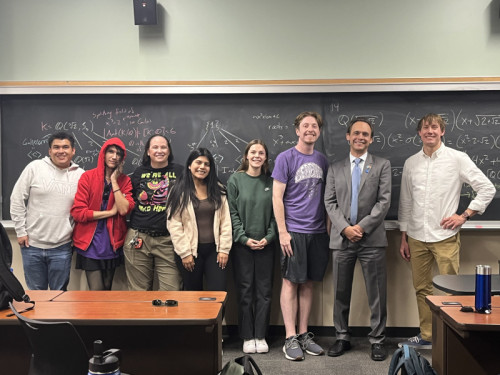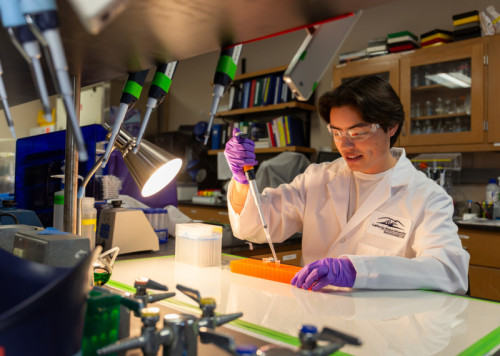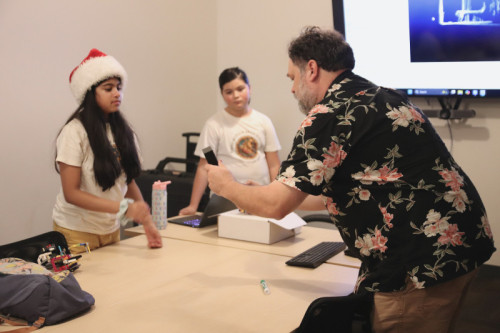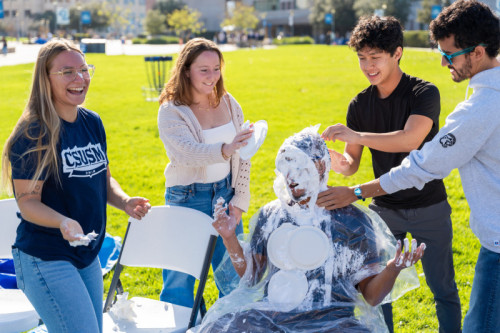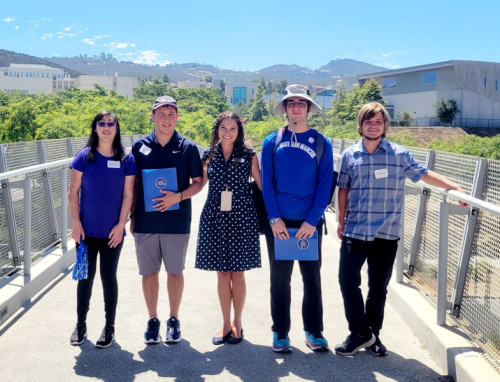BEARS Program Enhancing Diversity in Biomedical Workforce
Latest Newsroom
- CEO’s Classroom Experience, Family Legacy Fuel $10M Gift For Hunter HallGreg Hunter never wears a suit to his abstract algebra class at Cal State San Marcos. So when he walked in dressed up one evening, his classmates teased him for being “all dolled up.” Few would guess that he is the CEO of Hunter Industries, a global organization and the largest private employer in San Marcos – or that the company is also a longtime philanthropic partner to CSUSM and is recognized on the campus founders’ seal. To them, he’s just Greg, a student who slips into class with the ease that comes from sharing four semesters with his classmates. “Greg is effortlessly humble, which is so refreshing,” fellow student Travis Bourdon said. “We knew he was a professional but had no idea of the scope. He fits right in, has made friends and encourages us to think about complex concepts differently.” A lifelong learner and Cornell University graduate, Hunter enrolled at CSUSM to challenge himself and strengthen his analytical skills. But the experience quickly became something more as he found himself inspired and motivated by the students around him. “Their grit, backgrounds and excellence impress me, as does the passion and engagement of the faculty,” Hunter said. “CSUSM is a special place with a clear commitment to advancing social mobility and student success across the region. It means a great deal to continue my family’s legacy of support.” This experience, combined with the family’s longstanding commitment to CSUSM, inspired a transformational $10 million gift to fund a new STEM facility. Recently approved by the CSU Board of Trustees, the building will be named Hunter Hall of Science and Engineering and is scheduled to open in fall 2027. Hunter Hall will boost engineering enrollment from 500 to nearly 2,000 students, strengthen the region’s workforce pipeline and support economic growth. “We are deeply grateful to the Hunter family and Hunter Industries for this extraordinary gift,” President Ellen Neufeldt said. “Greg’s experience in the classroom gives him a unique perspective on our students, many of whom are the first in their families to graduate from college. Hunter Hall will be a landmark addition to campus, providing state-of-the-art STEM facilities, fueling regional innovation and strengthening pathways for future graduates.” The Hunter family has helped shape CSUSM’s history for three generations – including Greg’s grandparents, parents and aunt, Ann Hunter-Wellborn, who served on CSUSM's University Council before the campus was founded and has continued to advocate for many student success programs. Over the years, Hunter Industries has supported several pivotal projects, including the Clarke Field House, University Student Union, Hunter Design Lab and state-of-the-art physics laboratories. The company also provides internships, mentorship and faculty support, and employs many CSUSM alumni. As for balancing coursework and running a global company, Greg approaches his studies with the same focus and dedication that define his leadership. “Greg is an exceptional student,” mathematics professor Hanson Smith said. “He even makes time for office hours, which is remarkable for someone who is also a CEO. Students are typically career-focused. Greg already has an extraordinary career, yet he’s here because he loves learning, which is likely what makes him such an effective leader.” With the Hunter gift, CSUSM’s “Blueprint for the Future” campaign – the university’s most ambitious fundraising effort – has raised nearly 80% of its $200 million goal. The campaign reflects the university’s continued growth and its commitment to advancing social mobility across the region. Explore Blueprint for the Future to see how CSUSM is different by design. Media Contact Eric Breier, Interim Assistant Director of Editorial and External Affairs ebreier@csusm.edu | Office: 760-750-7314
- Finding Growth Through Patience, Campus InvolvementUnlike most children, Quetzalli Johnson wasn’t afraid of visiting the dentist. When she was growing up, her mother always made dentist trips a positive experience for Johnson and her brothers by offering them rewards for doing well in the office. Those positive childhood moments led Johnson to dream of working in health care and dentistry. Today, Johnson is one step closer to fulfilling that dream. “I’m so excited. I feel like the finish line is right there,” said Johnson, a fifth-year general biology major and pre-dental student who's graduating from Cal State San Marcos this month. “I’m really excited to navigate the world outside of school, spend time with my family and husband, and start working as a dental assistant during my gap year.” Along with a gap year to gain experience, Johnson plans to move to North Carolina with her family. She hopes to attend her top choice, the University of North Carolina, to study dentistry and become a dentist. Johnson was an active member of the Pre-Dental Society at CSUSM. She joined the campus organization in spring 2024 and became the social media officer during the 2024-25 academic year. Her efforts in the club helped her achieve the role of senior president this fall. “Being a part of that club taught me a lot about confidence and allowed me to be really comfortable speaking with other students,” she said. “I loved the leadership roles because of what they brought out in myself, and I loved being able to help and support others.” Not only did the Pre-Dental Society give Johnson a place where she belonged, but it also helped her understand the path to dental school. As club president, Johnson has tried to make clear to newer members that they should take their educational journey at their own pace. She often talks about her experience as a fifth-year student and how that extra time has benefited her academically. “I feel like a lot of members think they need to graduate within a certain time, because in high school that’s what we’re told,” Johnson said. “We’re told, ‘You have to graduate college in four years,’ and sometimes that can be a little discouraging. I think it's nice for the members to hear that I’m a fifth-year and see that I’m not defeated by it. I’m enjoying the ride.” Johnson also works hard to make the Pre-Dental Society a welcoming place for students. She encourages members to ask questions, informs them about volunteer opportunities and helps them connect with academic resources and see what lies ahead on the path to dentistry. Her passion for creating and fostering a loving environment is evident to her peers and professors. James Kezos, an assistant professor of biology, has worked closely with Johnson in the classroom and lab. “She is a very determined, hard-working and compassionate individual who has set high goals for herself,” Kezos said. “She is willing to learn and help with any task, showing exceptional levels of initiative and dedication. She excels at whatever responsibilities she undertakes, including her classwork, her research and her extracurriculars such as being president of the Pre-Dental Society.” In the Fly Lab with Kezos, Johnson began studying the physiological adaptations to chronic high-sugar diets in Drosophila (fruit flies) and how these diets affect their heart health and lifespan. Johnson explained that because Drosophila share many genetic traits with humans and have such a short lifespan, they’re ideal subjects for biological study. Alongside the study on high-sugar diets, Johnson has analyzed the Hedgehog signaling pathway in Drosophila heart function. “If we’re discovering new things that could help someone else’s future research, if it could be applied in any way and help the human population, I think that’s really neat,” Johnson said. “I love that we’re taking steps forward to potentially help people. That’s what I want to do in my future, help people.” As the Fly Lab’s sole data analyst, Johnson works closely with the flies’ heartbeats – noting that, in some cases, the flies have a fluorescent heart – by watching videos and turning that information into data through programs like Microsoft Excel. “The biggest impact she has made has been her efforts in implementing a large statistical code to process and analyze our fly cardiac videos,” Kezos said. “Without her help, we would not be able to analyze any of our data, and probably would be struggling with fixing the code.” Creating the code was a challenge that Johnson felt confident in tackling. She had data analysis experience from EOS Fitness, where she worked as a data coordinator. She also took a class on biological data analysis, so when Kezos mentioned that he had code that needed fixing, Johnson was quick to take on the project. It took Johnson roughly two months to go through the nearly 3,000 lines of code. She watched thousands of videos, quantified the data and made it possible for the lab to analyze all of their hard work. Johnson referred to the project as the ultimate puzzle. “It was so frustrating but also really rewarding,” she said. “That went beyond what I thought I was capable of, and just having the belief in myself that I could achieve that, it was such a rewarding feeling. It also strengthened my confidence in myself; I am capable of doing something like that. That was super empowering for me.” Johnson has used these new skills to teach other students in the lab how to use the code to analyze data. “Quetzalli has been an integral member of my lab, and has been a tremendous help in establishing the data analysis process,” Kezos said. “Without her efforts, initiative and care, we would not be as productive as we are today.” When looking back on her time at CSUSM, Johnson said her biggest advice for future students is to get involved. Transferring from Palomar College, Johnson thought she could handle everything on her own at CSUSM. She wasn’t thinking about joining clubs or finding community. But as she delved deeper into her coursework, she realized there was much she still needed to learn about the path ahead. She first heard about the Pre-Dental Society in a Biology 101 class, and the timing felt right. She decided to go to a meeting, and the organization ended up giving her the guidance and support she hadn’t realized she was missing. “I attended a meeting and thought, ‘This is so helpful,’ ” Johnson said. “Then, while I was at these meetings, I saw this community and the relationship between officers and members. I was like, ‘I really want to be a part of this,’ which was new for me. I had never felt like that before.” Being a member of the Pre-Dental Society and volunteering with the Fly Lab helped Johnson grow as a student. The knowledge she gained from both, combined with community support, helped her see how she could give back. Johnson’s newfound desire to get involved led her to participate in events such as the Student Poster Showcase. She presented a poster on the physiological responses to chronic high-sugar diets in Drosophila, the research she had done in the Fly Lab. “Get involved, because it doesn’t hurt; it only helps. You build such a great community and you learn so much. You’re able to meet like-minded people and grow as a human being,” she said. “Enjoy the ride. Enjoy where you’re at in the moment. Enjoy the people around you. Slow down and just enjoy where you’re at.” Media Contact Eric Breier, Interim Assistant Director of Editorial and External Affairs ebreier@csusm.edu | Office: 760-750-7314
- Cancer Survivor Spreads Awareness Through LegosWhen asked why he wants to be a doctor, Cristian Alvizo would often answer, “Because I like science and I love to help people.” But there was always so much more hidden behind that answer, including a diagnosis that altered Alvizo’s entire outlook on life. It wasn’t until he met one of his colleagues and mentors in a lab at Cal State San Marcos that Alvizo realized he needed to change his answer to that question. Alvizo was diagnosed with testicular cancer the day before his high school graduation. He attended a physical required for his high school golf team that didn’t thoroughly examine for testicular cancer. After his appointment, he felt the need to self-screen, and that’s when he noticed something was off. He requested another appointment – disguising it as an HPV vaccination so his parents wouldn’t worry – where he was advised to receive an ultrasound and meet with a urologist. After a month-and-a-half of anxiously waiting, Alvizo met with Jeffrey Zeitung, a urologist at the Scripps Clinic in La Jolla, who delivered devastating news: Alvizo had testicular cancer and needed an orchiectomy, which is the removal of one or both testicles. Alvizo remembers thinking: “I'm 18, I graduate tomorrow, my mom is in the waiting room, I was just told I have testicular cancer and now I have to get an orchiectomy next week. This is a lot at once.” But Zeitung made Alvizo feel comfortable in a very uncomfortable situation, assuring him that they would get through this diagnosis together. He guided Alvizo through the process, teaching him about the disease and comforting him with the knowledge that 99% of testicular cancer patients end up fine. “Seeing how my urologist comforted me during this time made me want the privilege to be in that same position for other patients as well,” Alvizo said. “It inspired me to move down the path of becoming a physician.” Since his diagnosis, Alvizo, who is graduating from CSUSM this month with a bachelor's degree in biology and a minor in Spanish, has involved himself in numerous opportunities to further his education and spread awareness for cancer patients. His biggest contribution has been the creation of a nonprofit organization called Bricks for Change. Started by Alvizo and a few friends, Bricks for Change aims to spread awareness for all types of cancer. “You usually hear about Breast Cancer Awareness Month, which is in October, and outside of that, maybe Childhood Cancer Awareness Month in September. But you don't often hear about the other ones, so our goal is to spread awareness for the cancers of every month,” Alvizo said. The nonprofit raises money to donate Lego sets to kids in the hospital with cancer. Since the organization launched in October 2024, it have donated 550 Lego sets ($9,000 total value) between Rady Children’s Hospital in San Diego and MemorialCare Miller Children's & Women's Hospital in Long Beach. Included in every child’s Lego set is a card that allows patients to share a photo of themselves with the set they built. The pictures are posted to the Bricks for Change Instagram page and website with clearance from the hospital. Alvizo plans to continue this organization for the rest of his life and is working toward making it a 501(c)(3) nonprofit to attract the involvement of larger companies and more funding. He also hopes to build connections with more hospitals as he begins medical school. This isn’t the only advocacy Alvizo has done for cancer awareness. He is heavily involved with the Testicular Cancer Awareness Foundation and ran his first marathon to raise money for testicular cancer awareness. Since then, he has found a passion for running and has completed seven marathons and 19 half-marathons for various charities. He has been asked to speak at the American Urological Association on behalf of the Testicular Cancer Awareness Foundation. Alvizo is finishing his last semester at CSUSM, where he has been a member of professor Julie Jameson’s biology lab since he was a senior in high school. After reaching out to her via email while in high school, Alvizo was invited to join her lab, in which they studied inflammation in the skin relating to various diseases like psoriasis and obesity. Alvizo co-published two scientific papers during his time in the lab and traveled with his lab colleagues to conferences to present their findings. Alvizo is also a STEM ambassador for CSUSM's Center for Research and Engagement in STEM Education (CRESE). Every week, CRESE ambassadors visit middle and elementary schools in the region to lead after-school programs and STEM-based projects to get kids interested in science. In addition, they staff a booth every March at Super STEM Saturday, which is where Alvizo first found his love for science as a middle schooler many years ago. Clinical experience is required to apply for medical school, so Alvizo has been interning at Palomar Hospital for the last two years as a weekly hospice volunteer. He has worked on both the ICU floor and in the emergency department, checking in on patients and providing them comfort. Alvizo also is in the process of obtaining his EMT license so he can transition into a paid clinical position during his gap year before medical school applications open in June 2026. Recently, Alvizo has had the opportunity to shadow Aditya Bagrodia, a urologist researching testicular cancer tumor markers in the blood at UC San Diego, as well as urologist Ramdev Konijeti, who works closely with Alvizo’s urologist at the Scripps Clinic. “It's been a privilege to have a full-circle moment where I'm at the same cancer center, in the exact same room I was diagnosed, but now I get to see it from the other way around. It's really surreal,” Alvizo said. So now, when asked why he wants to be a doctor, Alvizo isn’t hesitant to tell his story. He is reminded of words from a former lab colleague, Alex Gonzalez, who is also a cancer survivor: “Every cancer patient has their own story. Just even hearing a diagnosis of cancer is a big deal. But you have a way of advocating that a lot of other people don't because you are young and healthy. Your interest in becoming a doctor will go a long way for spreading the word about cancer awareness.” Which is exactly what Alvizo plans to do. Media Contact Eric Breier, Interim Assistant Director of Editorial and External Affairs ebreier@csusm.edu | Office: 760-750-7314
- Youth Lego Challenge Puts Archaeology Professor in DemandFor Jon Spenard, the start of this school year was hectic beyond the typical reasons – and beyond his wildest imagination. Spenard, you see, is an archaeology professor at Cal State San Marcos, and it was in about late August that archaeologists from around the world suddenly found themselves being bombarded with attention. As Spenard can attest, that’s not the normal reality for a scholar in his field. The reason for the surprising interest in archaeology? In August, the FIRST (For Inspiration and Recognition of Science and Technology) Lego League Challenge – an international competition for elementary and middle school students that attracts almost 700,000 kids – released its annual theme: “Unearthed.” As the website states: “Every artifact we uncover holds a story. Each tool, each innovation, each work of art connects us to the people and ideas that came before us. Using STEM skills and teamwork, today we can dig deeper into discoveries than ever before.” Almost overnight, Spenard was on speed dial. “No one was expecting this,” Spenard said. “Every archaeologist and museum I know was suddenly flooded with calls and messages requesting meetings.” So it was that on the afternoon of Nov. 24, Spenard met with a FIRST Lego League team named Bikini Bottom Brick Builders – three middle school girls from Temecula and their parents – in the Social and Behavioral Sciences Building. The team was trying to build a LiDAR scanner – an acronym for “Light Detection and Ranging,” LiDAR is a remote sensing method for creating 3D models of the real world – and Spenard talked to them about how the technology works, how it relates to archaeology and how they could use their newfound knowledge to make better scans. That consulting session was the latest of about a dozen that Spenard has conducted this semester – some on campus, some by email, some at a public archaeology event that he attended in October (Arch in the Park in San Diego). “The groups and their parents do deep research,” he said. “I think many found me through our departmental website.” Each year, the FIRST Lego League introduces schoolkids to a scientific and real-world challenge that will be the focus of their research. The competition involves designing and programming robot prototypes with Legos to complete tasks, and working out a solution to a problem related to the theme. The students meet for regional, national and international tournaments to compete, compare ideas and display their robots. Spenard’s assistance to teams in the region has run the gamut, from conveying the general nature of archaeology – hint: as he says, “it’s not dinosaurs!” – to listening to presentations to providing feedback on early design prototypes. Though wholly out of the blue, the experience has been a rewarding one for him. “My hope, more than anything, is that these kids have walked away with a much better understanding of what archaeology is and how it is done,” Spenard said. “My impression is that, collectively, these kids are doing amazing engineering work that will revolutionize the field of archaeology and many others someday.” Media Contact Brian Hiro, Communications Specialist bhiro@csusm.edu | Office: 760-750-7306
- Record-Breaking Giving Day Raises More Than $820KCal State San Marcos celebrated another record-breaking Giving Day this year, raising $828,397 from 2,444 gifts in just 24 hours. The total raised on Dec. 2 was $80,000 more than the previous record set last year. Giving Day is part of Giving Tuesday, an international day focused on philanthropy. The Giving Day highlights included: A number of matches were met, including $200,000 from the Epstein family, $10,000 from SchoolsFirst Federal Credit Union, $5,000 from North City and more than $100,000 in individual area frontline matches, benefiting 132 campus programs. 56 ambassadors brought in 329 gifts. Students made 318 gifts. Nearly one in five gifts came from alumni, who supported 119 programs, departments, colleges or scholarships. Every gift counts toward the university’s “Blueprint for the Future” fundraising campaign, the largest in CSUSM’s history. The campaign’s theme reflects both the physical growth on campus and the forward momentum building at CSUSM as one of the CSU system’s fastest-growing campuses. Founded in 1989, CSUSM serves 17,000 students and is proud to be ranked No. 1 in the nation for advancing social mobility. Media Contact Eric Breier, Interim Assistant Director of Editorial and External Affairs ebreier@csusm.edu | Office: 760-750-7314
- Faculty and Staff Secure Funding Across DisciplinesFor education professor Rebecca Brooks, receiving $2.5 million in grants to expand the Aspiring Scholars program is a dream come true. “It’s incredibly meaningful to give students with intellectual disabilities an inclusive college experience,” Brooks said. “My greatest hope was to obtain funding to expand our cohort size and ensure the long-term sustainability of this program. These grants make that vision a reality.” Funding at this level is highly competitive nationwide, yet faculty and staff at CSUSM like Brooks continue to stand out, securing awards that support innovative projects and create transformational experiences for students. “Our faculty and staff are pursuing some of the most-sought-after grants in the nation, alongside leading institutions,” said Charles De Leone, dean of graduate studies and research. “It’s exciting to see their ideas recognized and to watch how their work enriches our students’ experiences, strengthens our campus and serves our broader community.” Examples of projects funded this academic year include: Supporting chemistry and biochemistry students: A $2 million grant from the National Science Foundation will fund student scholarships in chemistry and biochemistry as well as a Vertical Mentoring Learning Community (VMLC). Led by Robert Iafe, Afra Panahi and Aswad Allen, the program blends mentoring, research opportunities and priority enrollment for up to 30 students each year, with eight first-year students eligible for renewable $15,000 scholarships. Making exercise more accessible: Kinesiology professor Todd Astorino received a $442,590 grant from the National Institutes of Health (NIH) to explore how reduced exertion high-intensity interval training (REHIT) – two short 20-second sprints within a 10-minute workout – can improve health and make exercise more attainable for inactive adults. Expanding mobile making in local schools: Funded by the National Science Foundation, this project led by Edward Price, April Nelson and Sinem Siyahhan of the Center for Research and Engagement in STEM Education (CRESE) expands the university’s Mobile Making program. Through after-school “making” clubs across North County, undergraduate STEM ambassadors bring hands-on activities and equipment to schools, libraries and community centers. Helping students with intellectual disabilities experience college: Brooks and psychology professor Allison Jobin received $2.5 million in grants to expand Aspiring Scholars with full-time staff, a dedicated campus space and additional peer mentors. Adding water refill stations: A grant from CalRecycle will enable CSUSM to reach its goal to have a water refill station on every floor of every building. Led by Juliana Goodlaw-Morris, director of sustainability and climate justice, in partnership with Facilities Development & Management, this grant will fund 10 new water refill stations and replace five older stations across campus. The project’s progress will be measured through station usage, recycling volumes and waste audits. “Each of these projects reflect the spirit of innovation and collaboration at CSUSM,” De Leone said. “They also give students meaningful opportunities to engage in hands-on research that prepares them for their future careers.” Research funding is an integral part of CSUSM’s “Blueprint for the Future” campaign, helping advance the university’s $200 million goal through both philanthropy and grants. Media Contact Eric Breier, Interim Assistant Director of Editorial and External Affairs ebreier@csusm.edu | Office: 760-750-7314








